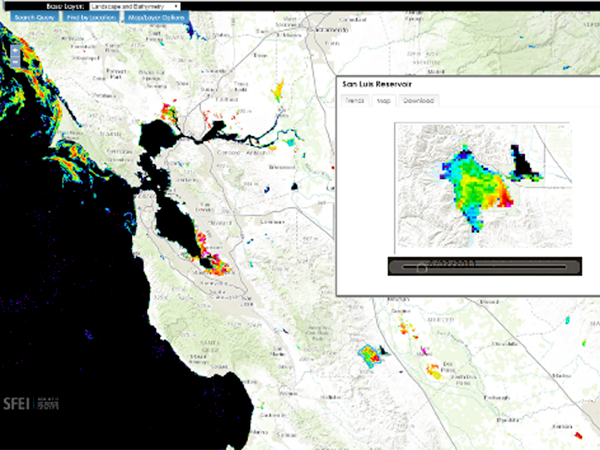Lindsey Sim
Lindsey Sim, MS
Geospatial Software Engineer
Environmental Informatics Program
Geographic Information Systems
Software Engineering
510-746-7333
Lindsey joined SFEI in 2015 as a Geospatial Software Engineer for the Environmental Informatics team. She received her Bachelor's at UC Santa Barbara and master’s at Oregon State University, both in geography with emphases in geographic information systems (GIS) and remote sensing. Previously she worked on deepwater and offshore oil spill modeling for the US Department of Energy. She has experience in spatial analysis, numerical modeling, web-GIS and web-mapping, web and graphic design, remote sensing, cartography, GIS-programming, and data visualization.
At SFEI, Lindsey provides expertise in geospatial applications, both for GIS and web-application development. She has served as technical lead for a number of web applications and GIS tools for a variety of applications including fish contaminant data, satellite detection of harmful algal blooms, and microplastic pollution.
Related Projects, News, and Events
 CRAM Bar-Built Estuarine (BBE) module now available to expand the applicability of CRAM (News)
CRAM Bar-Built Estuarine (BBE) module now available to expand the applicability of CRAM (News)
With funding from the State Coastal Conservancy, SFEI staff developed the eCRAM data entry forms for uploading BBE assessments into the CRAM database. Public assessments can be viewed on EcoAtlas' interactive map and downloaded using the CRAM filter tool.
 Evaluation of CRAM performance for assessing wetland stress, small wetlands, and wetland habitat development (Project)
Evaluation of CRAM performance for assessing wetland stress, small wetlands, and wetland habitat development (Project)
Caltrans funded this wetlands research to fill important gaps in knowledge about the ability of the California Rapid Assessment Method (CRAM) to assess small wetlands, wetlands stress, and the rate at which wetland restoration projects develop into mature habitats. Caltrans proposed specific tasks based on the research priorities provided by the CRAM Commitee of the statewide California Wetlands Monitoring Workgroup.
 SFEI provides perspective on emerging harmful bacterial blooms in the State's larger waterbodies (News)
SFEI provides perspective on emerging harmful bacterial blooms in the State's larger waterbodies (News)
The State has contracted SFEI to provide intellectual, scientific, and technical resources to support its efforts to monitor and report on the ever-growing problem of cyanobacterial blooms in its lakes and rivers. These blooms are such a serious concern because they can generate harmful toxins which can threaten wildlife, livestock, pets, and in certain cases, human life.
- ‹ previous
- 3 of 3

